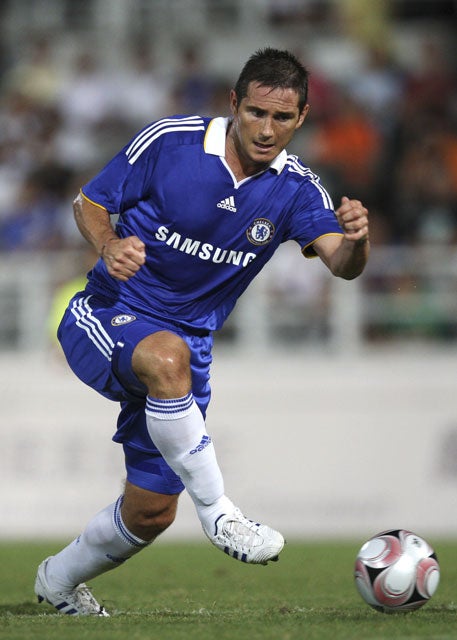Football stocks: You have to be football crazy to invest in your team
Want to make money from the beautiful game? You'll need more than a passing interest, says James Daley

Your support helps us to tell the story
From reproductive rights to climate change to Big Tech, The Independent is on the ground when the story is developing. Whether it's investigating the financials of Elon Musk's pro-Trump PAC or producing our latest documentary, 'The A Word', which shines a light on the American women fighting for reproductive rights, we know how important it is to parse out the facts from the messaging.
At such a critical moment in US history, we need reporters on the ground. Your donation allows us to keep sending journalists to speak to both sides of the story.
The Independent is trusted by Americans across the entire political spectrum. And unlike many other quality news outlets, we choose not to lock Americans out of our reporting and analysis with paywalls. We believe quality journalism should be available to everyone, paid for by those who can afford it.
Your support makes all the difference.A few weeks ago, the Chelsea and England midfielder Frank Lampard signed a deal that will make him the highest paid football player in British history. The £150,000 salary that he will command every week is more than the average UK citizen will earn in five years – an indication of how much money now swills around in the world of football.
According to accountants Deloitte, the total wage bill for Premiership clubs hit almost £1bn last year, while total revenues raised from TV rights, ticket sales and club merchandise were only around £1.5bn. As a result, all but the biggest clubs now struggle to break even each year, and many pin their hopes for financial success on making progress in a European tournament, or winning a domestic trophy.
With the road to profit so challenging, it's perhaps no surprise that there are now only a handful of clubs left that are quoted on the stock exchange. Back in the 1990s, as broadcasting deals helped clubs to boost their revenues year on year, clubs looked like a much more attractive investment – and several capitalised on this by listing on the market.
But as wage inflation accelerated and the growth in broadcasting revenues began to slow, the shine started to come off the sector. What followed was a handful of takeovers, as football clubs became the must-have toy for billionaires. Other clubs which were not lucky enough to be rescued by a rich benefactor, quietly delisted. But a few remained.
Today, there are 10 clubs left in which you can buy shares – Arsenal, Birmingham City, Celtic, Millwall, Preston North End, Rangers, Sheffield United, Southampton, Tottenham Hotspur and Watford – each of which have seen mixed fortunes over the past few years.
Of these, the only clubs that look to have any long-term stability to their profits are Arsenal and Tottenham – both of which are tightly held, and hard stocks for private investors to get their hands on.
Around 45 per cent of Arsenal's shares are held by members of the board, who have an agreement not to sell their stakes to any outsiders before April next year. And even then, the directors have first call on each other's stakes until October 2012. Furthermore, one Arsenal share will set you back £845, putting them out of reach of most small-time investors.
Tottenham is 68 per cent owned by ENIC, an investment company controlled by the English billionaire Joe Lewis. Like Arsenal, its share price has made great gains, rising almost 500 per cent over the past five years, as the business has been streamlined and the team performed better in the Premier League. Part of the success of these clubs' share prices has also been down to takeover speculation. But the likelihood of such returns being repeated in the near future are small.
For now, it is hard for top-level clubs to get their wage bills under control. If private club owners such as Chelsea's Roman Abramovich agree to pay their players £150,000 a week, this quickly becomes a benchmark, which other clubs have to compete with if they want to attract the best players and contend for a place in the lucrative European tournaments.
David Glenn, a partner at Pricewaterhouse Coopers, says wage inflation has become a particular problem for the Scottish clubs, which now receive next to nothing for their broadcasting rights, and so rely on making progress in Europe to boost their revenues.
"The lowest clubs in the English Premier League are getting around £15m a year in TV revenue," says Glenn, "whereas Rangers and Celtic are only getting about £1.5m each. Championship clubs now get more money for broadcasting rights than the Scottish Premier League."
Earlier this month, Rangers crashed out of the Champions League in the qualifying stages. Glenn says that financially this is a heavy blow for the club. "They had a fantastic run last year, going all the way to the Uefa cup final, which would have made them an extra £20m," he says.
Sadly, the economics of football are such that the chances of making money as an investor in the long-run are not strong. The best hope for investors is that their club gets bought out by the next Abramovich. But it's a gamble, and with the smaller clubs, there's as much chance that you'll lose everything.
If you want to invest in your club as a sign of solidarity, www.framedshare.co.uk will frame a share certificate for you to pin up on a wall at home. If you want to get involved any more seriously than that, make sure you're playing with money you can afford to lose.
Join our commenting forum
Join thought-provoking conversations, follow other Independent readers and see their replies
Comments